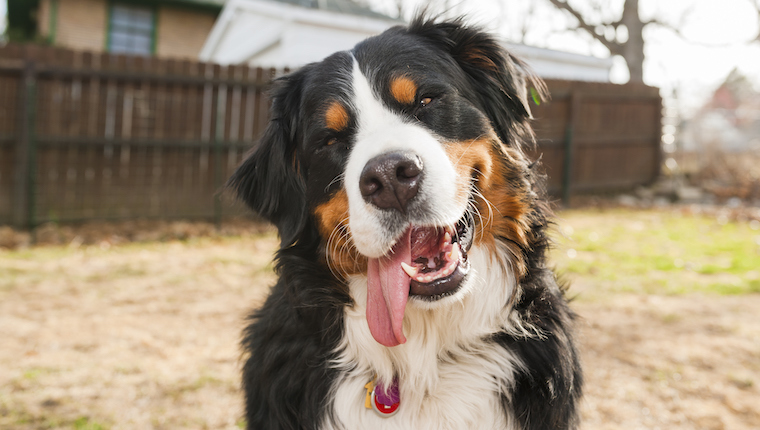
What are the dog laws in Iowa? Does Iowa have dog laws? If you live in this state, you might be wondering what the law says about issues like rabies vaccination, dog bites, dog cruelty, and dog chains.
Read on for more information about dog laws in Iowa.
What Dog Vaccines are Required by Law in Iowa?
According to Iowa Code 351.33, any dog over six months of age in Iowa must receive a rabies vaccine. This vaccine must be administered by a licensed veterinarian. Subsequent vaccines must come as recommended. For example, a one-year vaccine must be performed yearly, but dogs receiving a three-year booster do not need yearly vaccinations. Additionally, dogs must wear & display their rabies tag. It is legal for one to kill a dog not displaying a rabies tag. While one certainly hopes this does not happen often, it appears this law is primarily in place to prevent the spread of rabies from vicious dogs.
There are no medical rabies exemptions in the state of Iowa. That means that ill or injured pets cannot get a medical exemption from the vaccine. However, “Dogs kept in kennels and not allowed to run at large shall not be subject to these vaccination requirements.” It’s definitely not recommended your dog stays kenneled 24/7, but this is technically a loophole in the law.
If an unvaccinated dog bites a person, they will be considered as a potential rabies carrier. They will be put in quarantine for 10 days. If there are no rabies symptoms, they may return home post-vaccination. If they show signs of rabies, they will be euthanized for testing. If the dog is returned home, the owner must pay the cost of the 10-day impoundment.
What Are the Dog Bite Laws in Iowa?
According to DOGS AND OTHER ANIMALS, §351.28, “The owner of a dog shall be liable to an injured party for all damages done by the dog, when the dog is caught in the action of worrying, maiming, or killing a domestic animal, or the dog is attacking or attempting to bite a person, except when the party damaged is doing an unlawful act, directly contributing to the injury.” This would make Iowa a “strict liability” state, meaning that in almost all cases, dog owners are liable for dogs who bite.
There are cases where dogs will not be considered aggressors in attacks, even if previously proven to be dangerous. Dog owners are not responsible for attacks in which the dog was provoked or protecting the owner. This could include yelling at, hitting, or throwing objects at the dog. Additionally, if you were trespassing on private property and then were attacked by an otherwise contained dog, the dog’s owner would not be liable.
Additionally, in some cases, there may be a “common sense” prohibition on finding a dog owner liable. For example, most people know to leave an eating dog or a mother with puppies alone. Bothering an animal when you could predict aggressive behavior will not always result in liability for the owner.
A dangerous dog, particularly a repeat offender, may be euthanized if this is determined to be in the best interest of the safety of the community. After one documented bite, a dog is considered vicious in the state of Iowa. This means that subsequent bites may lead to euthanasia. Additionally, a severe enough attack could lead the court to determine euthanasia is the best course of action even for a first offender.
What Are Iowa Dog Abandonment Laws?
What is considered animal abandonment in Indiana?
According to MISTREATMENT OF ANIMALS, §717B.8, animal abandonment is illegal. The law notes that “A person commits animal abandonment if the person owns or has custody of a cat or dog and relinquishes all rights in and duties to care for the cat or dog.” This means that simply letting an unwanted animal go loose instead of finding new caretakers is illegal. Animal abandonment is always dangerous to animals and people that may encounter them. It’s always better to surrender a pet to a shelter or rescue if you cannot keep them.
What is the punishment for animal abandonment in Indiana?
MISTREATMENT OF ANIMALS, §717B.8 defines the strict punishments for abandoning an animal in Iowa. “A person who commits animal abandonment that does not cause injury or death to an animal is guilty of a simple misdemeanor. A person who commits animal abandonment that causes injury other than serious injury or death to an animal is guilty of a serious misdemeanor. A person who commits animal abandonment that causes serious injury or death to an animal is guilty of an aggravated misdemeanor.” If, for example, you abandoned an dog on the side of the road, and the dog was then struck by a car and passed away, you could find yourself guilty of an aggravated misdemeanor.
Who pays for an abandoned dog’s vet care in Iowa?
Anyone charged with animal abandonment may be subject to paying for their previously owned animal’s vet care, boarding, and any additional expenses incurred during their trial. This must be court-ordered, so in some cases, the owner may not be held financially responsible.
What Are Iowa Dog Cruelty Laws?
What is considered dog cruelty in Iowa?
Iowa has a wide range of defined actions that are viewed as animal cruelty. According to Iowa Code §§ 717B.2, 717B.3A, 903.1, 902.9 (2020), it’s illegal in Iowa to neglect confined animals by failing to provide them with adequate food and water, sanitary conditions, ventilated shelter that protects them from the weather, and veterinary care and grooming that’s needed to prevent suffering or negative health effects. It is also illegal to inflict pain or suffering on an animal without a need for self defense.
What is the punishment for dog cruelty in Iowa?
Animal neglect or abandonment is generally a simple misdemeanor in Iowa (punishable by a fine of $65-$625 and/or up to 30 days in jail), but this offense becomes a serious misdemeanor if the animal was injured as a result, or an aggravated misdemeanor if the animal was seriously injured or died. (Iowa Code §§ 717B.3, 717B.8 (2020).) Additionally, a judge may order you to undergo a psychological evaluation and/or mental health treatment. You may also lose custody of any animals in your care.
What is the punishment for dogfighting in Iowa?
As in the other 49 states, dogfighting is a felony in Iowa. This doesn’t apply only to those directly fighting their animals. Charges can also occur for those betting on or attending dogfights in Iowa. It’s also illegal to train dogs for the intent of fighting, even if you aren’t directly participating in dogfights.
What Are Iowa Dog Chain Laws?
Tethering or chaining a dog is legal in Iowa. Somewhat controversially, Iowa does not have restrictions on tethering dogs. This can lead to neglectful situations technically not found to be illegal. However, tethering improperly can still be prosecuted as animal cruelty. For example, a painful tether that’s too heavy for the dog could be viewed as inflicting harm, leading to an animal cruelty charge. Keep in mind that some individual counties may have specific ordinances, so research your specific area. As a general rule of thumb, if you tether your dog, provide them at least three times the length of their body for space, keep the area clean and free of debris, attach safely without a choke collar, and provide shelter, food, and water.
How Does Iowa Dog Law Rank Against Other States?
Sadly, the Animal Legal Defense Fund ranks Iowa at number 41 out of all 50 US States for animal protection laws. This makes Iowa a “bottom-tier” state by their standards. There’s some things to love about Iowa’s animal defense laws. For example, assigning psychological evaluations to offenders can help prevent future offenses. However, there’s a lot to improve on too, such as a complete lack of tethering laws, and poorly defined animal cruelty laws that leave wiggle room for abuse.









